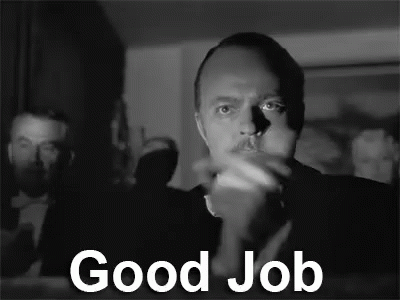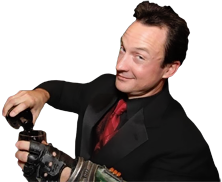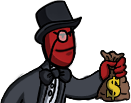Owen Brierley
What do you think about alternative funding sources like crowdsourcing?
Trent
Well, fundamentally, I believe that every product has one major market opportunity. There’s that one moment when you can galvanize interest and excitement in your project, and turn it into either investment or profit. And when you do it at the Kickstarter phase of the crowdfunding phase, you’ve basically said, “I’m going to take all the future potential of this project and I’m going to leverage that today for the funding that I can raise.” The end result is you wind up at the finish line out of money, waiting for additional sales to hopefully come through. Crowdfunding is just borrowing against all future revenue. And it’s pretty easy to get into a scenario where you can actually pre-borrow more revenue than the project can make.
Owen Brierley
What keeps you in Alberta?
Trent
At Beamdog, we have employees all over Canada right now. We have employees in Nova Scotia and Vancouver, and we’re continuing to recruit remotely because, while there are some areas where it’s easy to get certain skills in Alberta, some skills are really hard to find here. We have to go looking afield for those.
Going forward, if there is no IDMTC replacement and I’m looking at our future growth, it’s not in Alberta. That could mean setting up a branch office. We have those discussions on a weekly basis.
Owen
You mentioned people and the availability of the skills in Alberta, what are your thoughts on that?
Trent
It takes time to build skills. Especially if you’re in an industry that’s really competitive. The joke in video games is: “Every five years you get to relearn everything.” The tools change. The platforms change. There’s some major disruptive event at least every five to 10 years. A new console cycle comes out and everything you knew about the previous cycle is no longer valid.
You also need to change the way you do things. Toolchains rapidly iterate. The tool of today is the relic of tomorrow. So you’re jumping on a new tool and relearning. It’s a constant evolution. What we really want in the video games industry, and I think tech as a whole, are people who have an aggressive learning philosophy and who can jump in and move from tool to tool. We don’t want technicians who are hyper-specialized in one tool, because in five years that tool is irrelevant. It’s a mindset and an enabling kind of education. It’s an industry of autodidacts.
In many cases, the things that people really love about video games, the great little one-off moments, are created by somebody thinking: “I wonder if I could do this, I think it might be interesting.” And they chase it. One of the empowering wonderful things about game development is it’s filled with a ton of initiative and curiosity. And that’s what is so hard to communicate outside to those in school.
We’ve weathered the hardships of the past couple of years. We will continue to weather what’s happening with COVID. We’re working on projects that interest us. And I think that’s why we’re continuing to invest. And that’s really why we’re still in Edmonton because we are surviving despite some horrific scenarios. We’re still succeeding because we’re excited about what we’re working on. We’re stubborn as hell, and we’re committed, we’re gonna make this happen.
Owen
Can you tease us with a little bit of what’s going on with this new intellectual property you’re working on?
Trent
It’s something totally different than what we’ve worked on for a long, long time. If I think philosophically about where we’re at, I imagine us, over the years, as a group working on orchestral music. We’ve been working with an orchestra, we got our strings, we’ve got woodwinds and brass. And then one day we thought: “What if we stripped it back? What if we went to a three-piece hardcore rock band? No bullshit. All Metal. All fun. Let’s just go for it.” So, whereas previously we were doing Vivaldi and Wagner, now we’re doing the White Stripes.
I think our hearts are always in the same place. It’s just a question of how we express ourselves. This is definitely a good shift for us. I love to say: “I’m having a lot of fun playing the game we’re making.” It has been a long time since I can honestly say that, because previous games I played, even back during the Bioware days, I knew the story. I knew how things were going to play out and I knew the mechanics and how things were going to be way in advance. And I think what we’re doing now is just so much more actively generative. It’s much more engaging. People will be surprised when we start showing the game, I can definitely say that.
Owen
I am super curious now! I can’t wait for it to launch. What platforms are you targeting?
Trent
We’re shifting platforms and concentrating on PC. It’s kind of our happy place. As always, we got an eye on consoles, and what’s happening in that world.
Owen
What do you think about the developments in XR?
Trent
So, I’m old. I’ve been around since the first time we took a kick at VR. I worked on Shattered Steel, which, back in the day, had these IO glasses and the VFX1 headset. We ported that game to VR and it was actually pretty decent because you could turn your head, and that would turn the head of the robot. But even then, it wasn’t that great. I mean, back then the technology was horrible. The refresh rates were brutal, with no resolution. The IO glasses were 320 pixels by 200 pixels or 320 by 100 per eye. It was a brutal resolution. But it was is pretty cool at the time.
The thing that I’m now seeing with VR is it’s still so different from what a lot of games do. Just movement in VR feels inherently wrong. So rethinking movement, conceptually, from a VR-specific standpoint, you just have to do.
I’ve always thought, if I did a VR game, what would I do? And the answer is something totally different, something that really plays to the strengths of VR, and completely avoids the differentiation from current games. I would never make a third-person shooter for VR, for example.
For me, AR is the more exciting opportunity, but less from an entertainment perspective and more from a functionality standpoint. What gets me excited about AR is the building on the future, like being able to architect things, being able to look at something with an overlay. To be able to put what you’re thinking about on top of what’s already there, and just essentially do interactive engineering, that excites me.
Owen
Let’s talk a bit about the world outside of the game. What got you into blacksmithing?
Trent
I got into blacksmithing in a strange way. Cameron and I had started doing another startup, specifically around solar panels, and building a system for solar panels that actually tracks the sun throughout the day. One of the challenges in Alberta is we’ve got great amounts of sunshine, but in the summer, it goes straight overhead, and in the winter, it just bubbles up on the horizon. Also, we have to deal with snow that piles up on the panels. Having panels that at least do some kind of tracking made a lot of sense.
I designed and built a prototype array mounting system, and had to rent shop space to do that. Cam was supposed to do the control software for it. So I built this thing and shipped all these bits up to him. And then I thought, “okay, well, I’m waiting for Cam. I’ve got the shop space so I might as well do something with it… Hey! Blacksmithing!.” So I did some research, and built a forge and then a belt grinder. So I really got into blacksmithing by making all the tools that a blacksmith needs.
Then I found a local fellow, Sean Cunningham from Front Step Forge (
https://frontstepforge.com/), who teaches Blacksmithing 101 at NAIT. He agreed to mentor me. So we started building some stuff.
Blacksmithing was very satisfying for me, because in my day job as a CEO, especially in the game industry, I need a whole team of people who actually are doing the work. My role within that group is to make sure that we’re all aligned, that we’re doing the work that’s going to offer the most value, and that we’re creating the product that we’ve all agreed on. I actually personally do no direct work on a video game anymore. And I missed that creative outlet. Once I started blacksmithing, I rediscovered how much I like creating things, and how much being able to do that by myself without needing anybody else was an important part of who I am and what I enjoy in life.
One of the great things about it is, I do a lot of things outside of the office… I always have. Even during my time at Bioware, I always had some other thing that I did that was away from the office. It kept me balanced and it relieved my stress. In many cases, I had a different peer group outside of the office, that in some cases was completely unaware of video games and what’s going on in the industry. As a result, I was involved with two or more completely different groups of people at all times. I think that’s really helped keep my head pretty level. You don’t get caught up in the video game industry drama. These other friends of mine don’t even care about video games. They don’t even know about it.
I try to encourage people to have some kind of interest outside the office. There were periods at Bioware where I was working insane hours, I was crunching to finish a game for a long time. I dialed back every other activity that I was doing. It was some of the loneliest and most miserable times in my life. Ultimately, I was proud of the product that was created from that work, but it took me years to get back to a personal balance and feel like a normal robust human.
Owen
Tell me more about getting into racing.
Trent
Years and years ago, when I was still at Bioware, I decided I wanted to get into racing. In the want ads, a Mazda RX-7 came up that was in my price range, but it was blown up. I thought to myself, “I am mechanically competent. How hard could it be?”
I bought this car and drove it to my house with the engine smoking like you would not believe. Obviously, there was something very, very wrong going on inside. I discovered that it needed new parts, so I went to a shop that caters to Mazda RX-7 specifically. In the back of their shop was this car that had a roll cage welded in. I asked what it was and they said: “Oh, that’s a Challenge Class car. We race those down in Calgary. There’s a race next weekend, why don’t you come to watch?”
So, the next weekend, I drove down to Calgary and I watched the race. I knew after that event that this is what I want. A couple of weeks later, I had signed up for my license, done my licensing course, and started building a racecar. Later that year, I started racing a Mazda RX-7 in the Challenge Car Class at the back of the pack. Over the course of the next couple of years, I raced my way up to near the front and then branched out to different cars.
Currently, I’m road racing in an endurance series with other drivers. We have a team and share one car. We typically do longer races — the last one we did was eight hours in length. Each driver gets a two-hour stint. When you’re not driving, you’re the crew and are responsible for taking care of the car when it comes in: fueling it, getting the last driver out, getting the next driver in. It’s like the best team sports and individual contributor thing you can imagine mashed together into eight hours of moments of crazy highs and lows. It’s so much fun.
Owen
Tell me more about why you champion hobbies or passions outside of video games for your team.
Trent
I have yet to do a hobby that hasn’t had some application to another aspect of what I’m working on. When I’m making video games… you want to talk about blacksmithing? You want to talk about how weapons are made? I happen to be an expert on that. You want to talk metallurgy? I can go pretty deep on metallurgy. You want to talk about aerodynamics, or how things work from the racecar side of things? Or remote control airplanes? (I used to be pretty involved in those). I’ve got all these experiences that I look at as my life experience toolbox.
I’m a firm believer that, when making video games, the best way to create something really compelling is to create something that has aspects of something you love in it. That’s what I bring to every product I work on. I bring aspects of what I love, and I throw what I’ve got into the mix.







![The Year of Incline [2014] Codex 2014](/forums/smiles/campaign_tags/campaign_incline2014.png)














